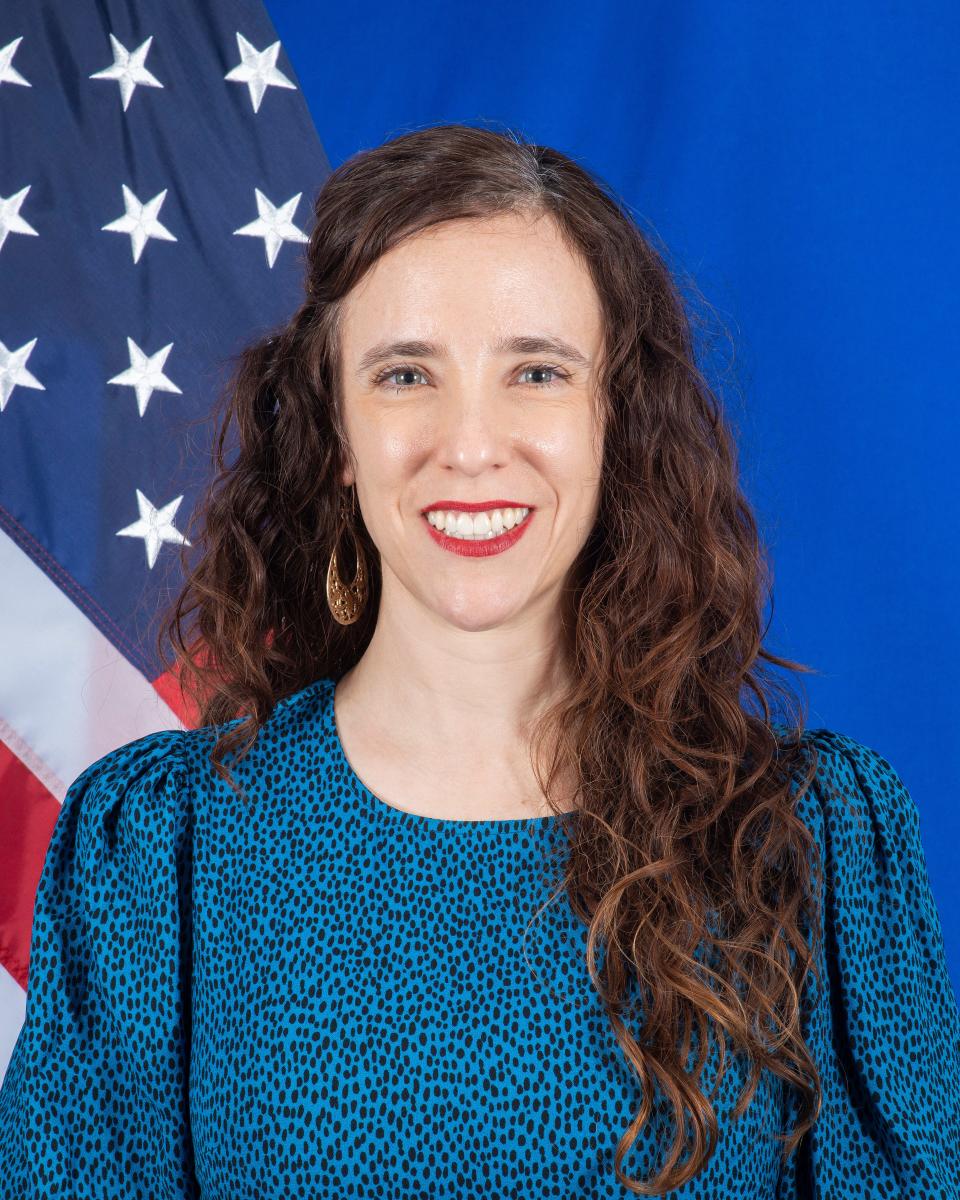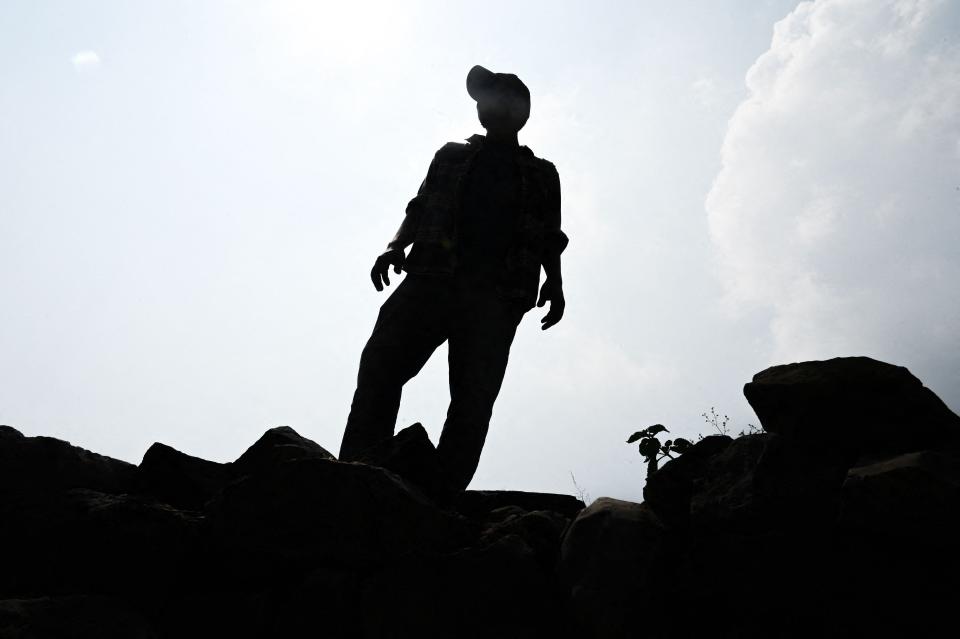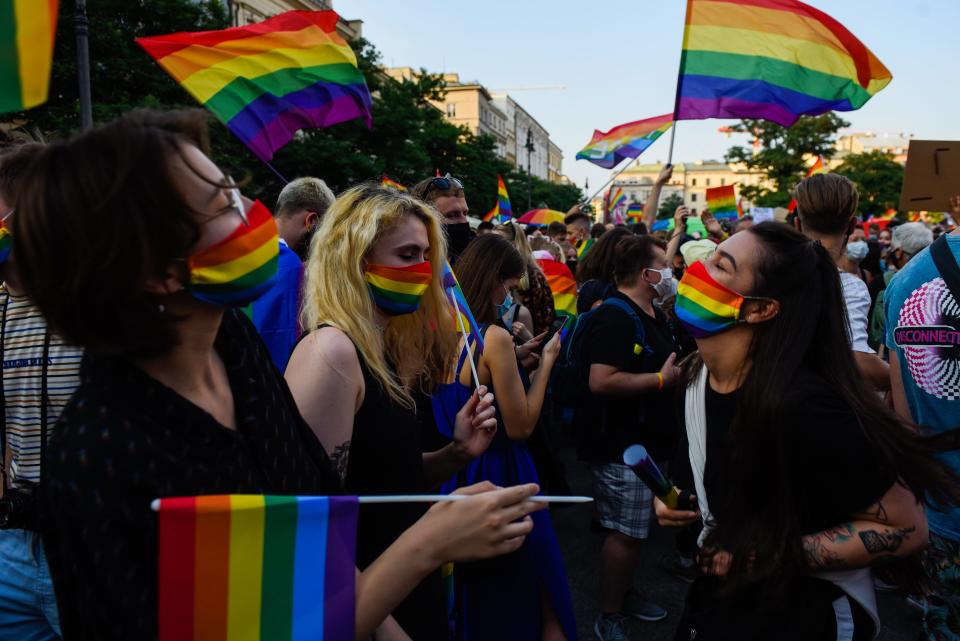US envoy advances LGBTQ rights in a world of 'mind-boggling' violence, discrimination
- Oops!Something went wrong.Please try again later.
- Oops!Something went wrong.Please try again later.
WASHINGTON – Jessica Stern is on a mission to advance the cause of LGBTQ people in a world where violence and discrimination based on sexual orientation know no geographical boundaries.
Gays and lesbians in Afghanistan are hiding in fear for their lives after the Taliban's terrifying return to power. A new law in Hungary makes it illegal to display or share with minors any materials that depict homosexuality or gender issues. Lawmakers in Ghana and Senegal are pushing bills to lengthen jail sentences for people convicted of same-sex relations.
In the United States, conservative state legislatures introduced more than 100 pieces of legislation in the past year alone to restrict the rights of transgender Americans.
“There is not a single country on the planet that is free of discrimination or violence targeting LGBTQI+ people,” said Stern, the State Department’s new special diplomatic envoy on LGBTQ rights.
“In every country, LGBTQI+ people suffer from employment discrimination, bullying in school, family rejection, disproportionate harm from COVID-19, and what I consider to be mind-boggling rates of violence.”
Stern’s job is to promote and protect LGBTQ rights around the globe, a task that often involves a diplomatic balancing act. Social, cultural, political and religious differences mean it’s sometimes more effective to work in the background than on the front lines. It’s a diplomatic protocol she’s still sorting out as she settles into the job.
“I want to understand how we can speak out, if we can speak out, when we can speak out and when we need to work behind the scenes,” Stern said.
President Joe Biden appointed Stern as a special envoy in June, citing her work on gender, sexuality and human rights issues as executive director of OutRight Action International, which aims to eradicate persecution, inequality and violence against LGBTQ people all over the world.
Stern, who is only the second person to ever hold the job, officially started in late September.
One of her first assignments was to help the State Department launch a passport with an “X” gender designation for people who don’t identify as male or female. Supporters said the move would help people who are transgender or who identify as non-binary, intersex and gender non-conforming avoid harassment and discrimination when they travel abroad.
When the first passport with the “X” gender designation was issued in October, “my phone was deluged with friends from everywhere who told me how much that policy advance meant to them,” Stern said.
The passports are expected to be more widely available early next year once application forms and the department’s computer systems are updated.
More: How Joe Biden became the most LGBTQ-friendly president in U.S. history

'A really dangerous situation'
Stern said she also has been involved the administration’s efforts to address the needs of LGBTQ people seeking asylum in the United States.
The Trump administration imposed new restrictions on immigration and dismantled many of the support systems available to asylum seekers and refugees seeking to resettle in the U.S. Critics point out that the Biden administration’s continued use of restrictive border policies such as Title 42, which allows border agents to expel asylum seekers to Mexico to prevent the spread of coronavirus, are often a significant hurdle for transgender people seeking asylum in the U.S.
The Rainbow Railroad, a U.S. and Canadian group that helps LGTBQ people facing persecution based on their sexual orientation or gender identity, said it also has struggled to resettle LGBTQ refugees from Afghanistan into the United States.
Afghanistan was never a welcoming country for LGTBQ people. But the situation changed overnight – from bad to horrific – when the Taliban regained power in August, said Kimahli Powell, Rainbow Railroad’s executive director.
“Raids (by the Taliban) are common, instances of violence are common,” Powell said. “It's just a really dangerous situation for the community right now.”
More: LGBTQ communities face a perilous global landscape even as Biden pushes for protections

Rainbow Railroad has fielded about 1,000 requests for assistance since the fall of Kabul in August. The group has been able to help about 100 people escape to safer countries and is triaging other requests, Powell said.
The organization has asked the Biden administration to help set up an expedited process to accept and resettle LGBTQ refugees from Afghanistan. But while it has worked with government officials in the United Kingdom to resettle Afghan LGBTQ refugees, the group has not been able to get any resettled in the U.S. so far, Powell said.
“I believe we have the ear of the government,” he said. “I believe the government has a willingness to help, but that has not yet resulted in the action that's required.”
Powell noted that Biden signed a memorandum in February to advance the rights of LGBTQ people. “Afghanistan is a real important opportunity for the administration to demonstrate their ability to follow through on the commitments of that memorandum,” he said.
Stern said the U.S. recognizes that LGBTQ Afghans are among the most at-risk people in that country and has been providing assistance to them. Some LGTBQ Afghans have resettled in the United States, she said, although she declined to say how many, citing the need for sensitivity and confidentiality.
David Stacy of the Human Rights Campaign, the nation’s largest LGBTQ advocacy group, applauds Stern and the Biden administration for making LGBTQ issues a central part of the nation’s foreign policy.
It’s critical that U.S. embassies and other governmental offices across the world serve as places where LGBTQ people in distress can come for help, he said. In places like Ghana, people’s lives and livelihoods are subjected to serious threats, he said.
“The role the U.S. government plays here is not always to be loud and shouting from the rooftops,” Stacy said. “Some of the most successful efforts can be the U.S. making clear privately that there might be consequences for these things.”
More: How a Supreme Court decision last year is reshaping the legal battle over LGBTQ discrimination

U.S. 'not perfect' on LGBTQ issues
Stern said the U.S. is putting a lot of energy into supporting the decriminalization of homosexuality around the world.
Around 70 countries still have some form of sodomy laws that make gay sex a crime, although enforcement varies from one country to the next. Recent efforts in places like Ghana to lengthen jail terms for people convicted of same-sex relations and force some of them to undergo “conversion therapy” – a discredited practice that aims to change a person’s sexual orientation – are a troubling development, Stern said.
As the U.S. works to advance the cause of LGBTQ people abroad, it’s important to also acknowledge the recent assault on those rights at home, Stern said.
“The United States is not perfect,” she said. “But I've seen this administration strive to be open about our shortcomings, which I think gives us credibility as we try to find the way forward in the United States and also as we work to support LGBTQI rights abroad.”
Work on these issues matters, Stern said, because “the treatment of LGBTQI+ persons is absolutely one of the leading human rights struggles with our time.”
“These issues are not easy,” she added. “If they were, there would be no homophobia or transphobia. And my office would not need to exist.”
Michael Collins covers the White House. Follow him on Twitter @mcollinsNEWS.
Contributing: Deirdre Shesgreen
More: Religious freedom vs. LGBTQ rights: Supreme Court sides with Catholic foster care agency
More: 'We'll remember': Biden signs law designating Pulse nightclub site a national memorial
This article originally appeared on USA TODAY: US LGBTQ envoy promotes rights in world of 'mind-boggling' violence

